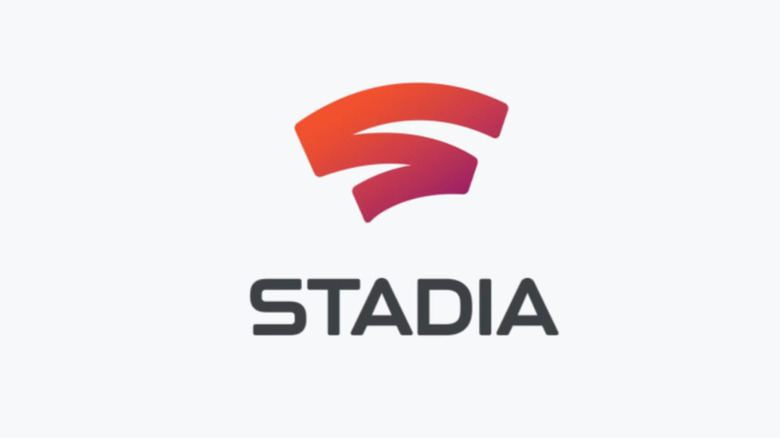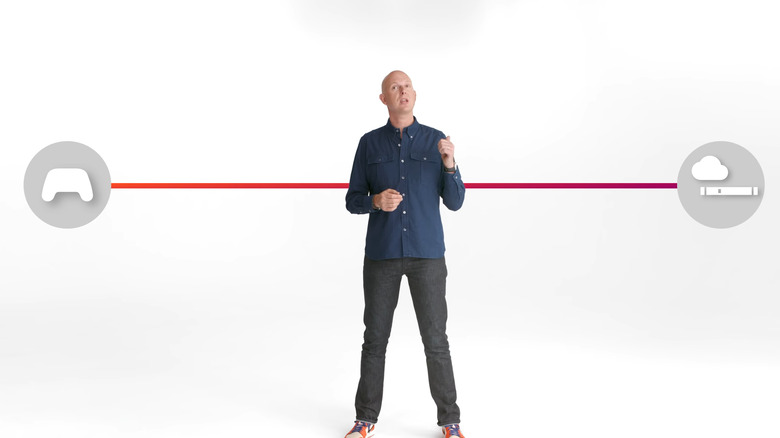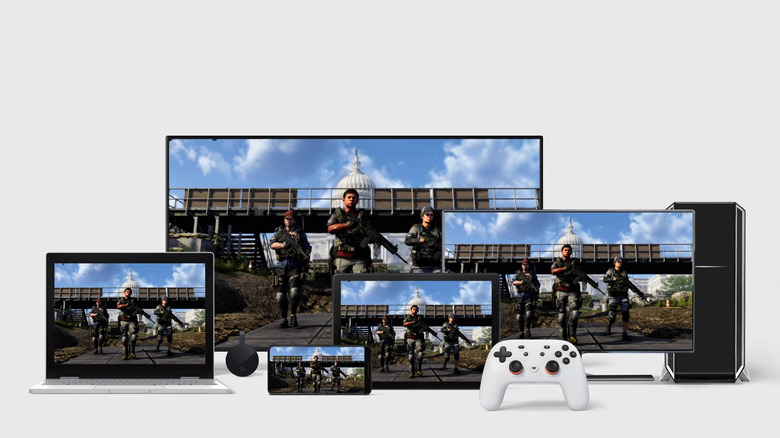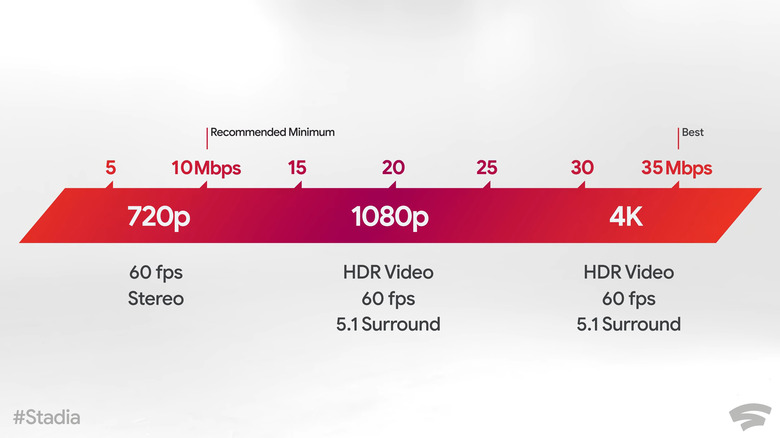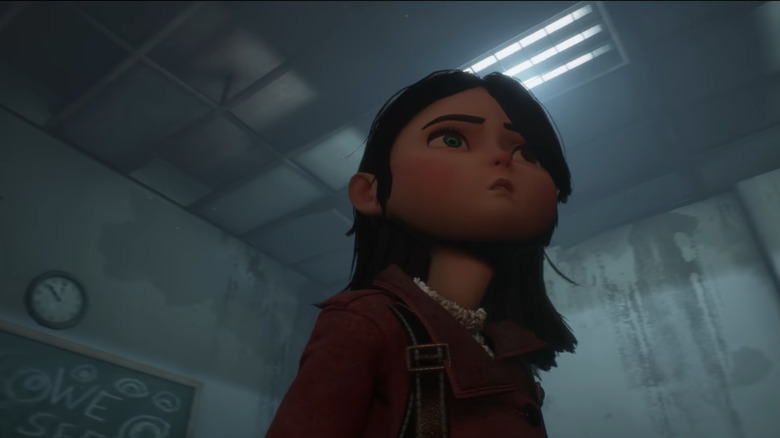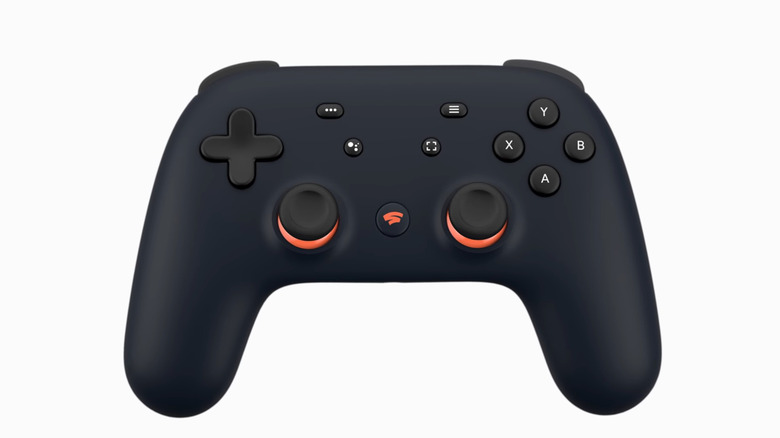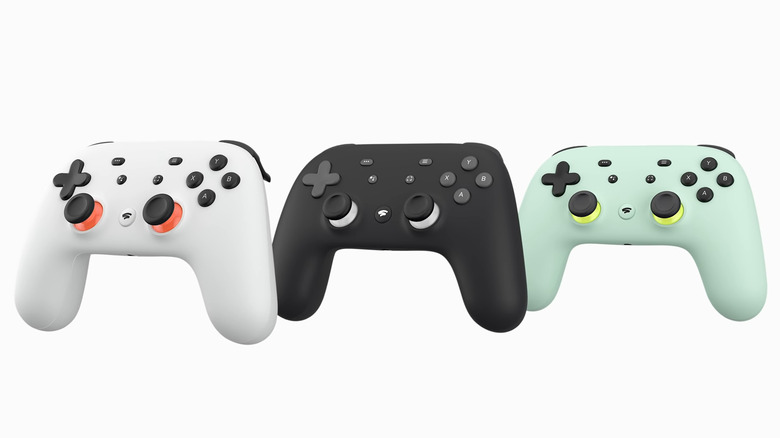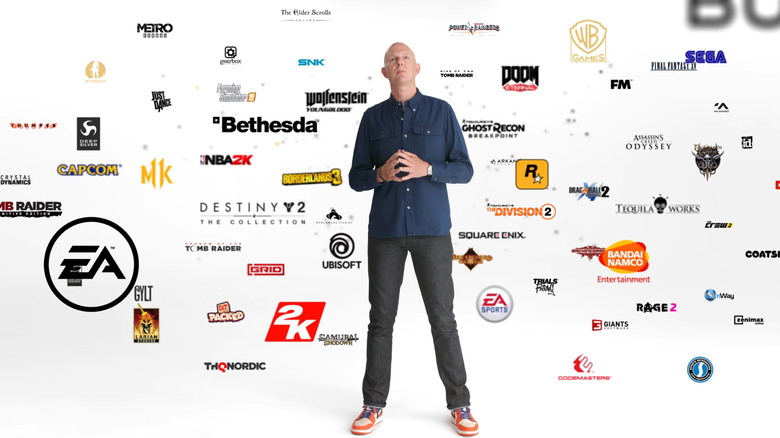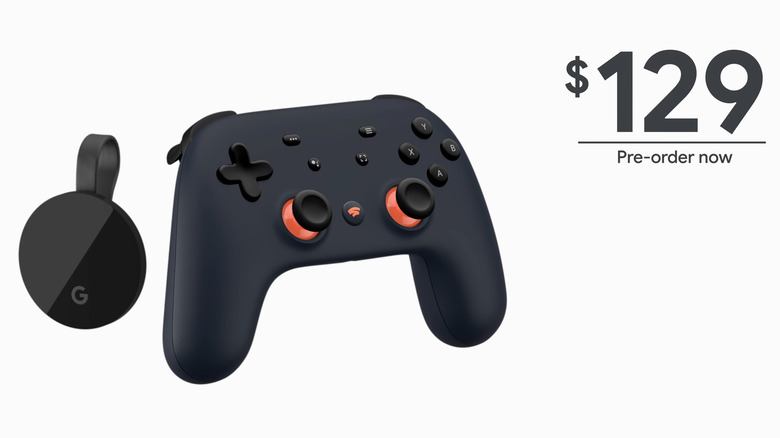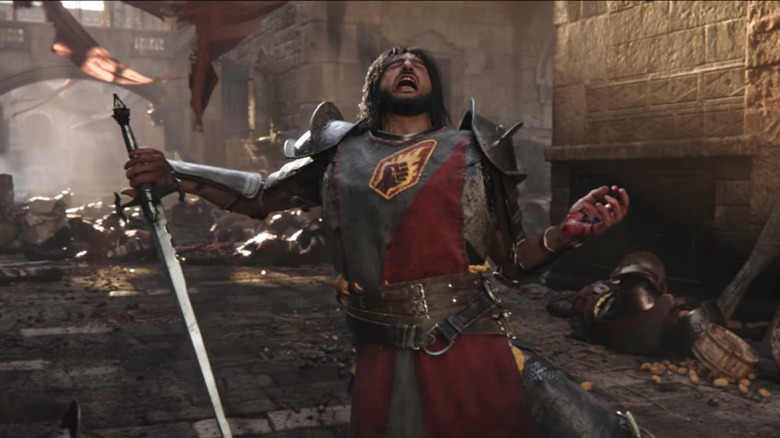Read This Before You Sign Up For Google Stadia
For a few generations now, the console scene has been dominated by Sony, Microsoft, and Nintendo. Each one has had varying degrees of success with each generation, but nonetheless, no other company has been able to muscle its way into that crowd. Well, Google's giving it a shot with its up and coming platform, Stadia. The streaming service was first revealed back in March, during a panel at the Game Developers Conference, and it sparked many questions concerning its radical approach to gaming.
Since then, Google has slowly but surely answered more questions about Stadia. Have they answered enough to convince you to buy into it? That's up to you to decide. To help you make that choice, we've compiled everything you need to know about Google Stadia, so you'll be as informed as possible before you sign up. After all, when it releases in November 2019, it could be a turning point in the history of gaming. Will this revolutionize how we see video games, or is this just another failed project, like Google Glass?
What is Google Stadia?
At this point, you know how video games work. You have to buy a console or PC, buy a disc or download games directly to the hard drive, and play from there. Everything is local to whatever device you have. Google wants to throw all that convention out the window by letting you stream games directly to a variety of devices. You'll connect directly to one of Google's servers, which will do all the processing while streaming the game to you. This isn't the only attempt at cloud gaming we've seen recently, considering Microsoft's Project xCloud and EA's Project Atlas.
With Stadia, your gaming experiences could all be wireless, and as long as you have a decent internet connection, you could play games theoretically anywhere. The company has teamed up with a variety of studios to bring a whole host of games to the new platform, and there will even be Stadia exclusives further down the line.
What devices work with Stadia?
Upon launch, Stadia will work with any computer, whether it's a laptop or desktop. As long as it runs Google Chrome, it will have access to Stadia and all of its services. Just connect a controller and you're good to go.
However, Google has grander ambitions, as one of the main selling points of Stadia involves transferring your gaming experience across many screens. Stadia will also support all Pixel 3 and Pixel 3a smartphone models upon launch, with plans to expand to more mobile devices as time goes on.
But Google doesn't plan on stopping there. If you have a Chromecast Ultra, you can also stream these games to your TV in up to 4K resolution. So in theory, you could start a game on your laptop, switch over to your phone, and pick up where you left off on your TV, all in a seamless experience. As long as these devices have a connection to the internet, you'll have access to Stadia.
How good does your internet need to be?
Of course, you might be wondering, what sort of internet speeds would you need to buy into this? Everyone's average speed varies across the world, but Google has committed to making Stadia work on as many sorts of connections as possible. The minimum you'll need is 10 megabits per second, which will net you the most basic form of streaming. You'll get 720p resolution at 60 frames per second along with stereo sound.
If you have a faster connection though, you'll be able to get higher quality video and audio. At roughly 20 Mbps, you'll find 1080p resolution at 60fps, with 5.1 surround sound to boot. For people with even better connections, you'll get a whopping 4K HDR stream sent to you, all at 60fps. That includes the surround sound, as well. To get the best quality, though, you'll need a connection that runs at 35 Mbps or faster.
Will there be exclusives?
It looks like Google is taking some inspiration from Microsoft, Sony, and Nintendo by including some exclusives in its Stadia lineup. In some cases, Stadia will share exclusivity with another platform. For example, Larian Studios' recently announced RPG, Baldur's Gate 3, will launch simultaneously on PC and Stadia.
Aside from the RPG, smaller titles, like Get Packed from Coatsink and Gylt from Tequila Works, will launch only on Stadia. The first title is a wacky co-op game about people moving out of a home, and it has an Overcooked flair to it. Meanwhile, Gylt seems like a horror game that has you play as a little girl in a creepy school. Whether those games will come to other platforms is unclear at the time of writing.
Additionally, Google started its own internal game studio to develop titles exclusively for Stadia. This studio has Jade Raymond at the helm, who has been a producer and executive at EA and Ubisoft. The move clearly shows the company's dedication to the platform as it tries to entice more consumers.
What countries will get Stadia?
Google is taking an international approach to the Stadia launch. In November, many countries in the western hemisphere will have access to the platform. The United States and Canada will get the first crack at Stadia in North America. However, Hawaii, Guam, and the US Virgin Islands will not be supported, despite the former being a state and the latter two being US territories. Contrarily, Alaska and Puerto Rico will have Stadia at launch.
In Europe, a whole laundry list of countries will get it on launch. The United Kingdom, France, Italy, Germany, Spain, Sweden, Denmark, Norway, Finland, Belgium, Ireland, and Netherlands can look out for Stadia in November. At the time of writing, Google hasn't mentioned any plans to roll out the service beyond the listed countries. In the FAQ, the company wrote that it "will not be able to deliver Stadia to everyone on the planet."
The Stadia controller
To go along with the new platform, Google plans on releasing a new gamepad. On the whole, it bears a resemblance to Sony's DualShock 4, with two thumbsticks on the inside of the gamepad. The controller will also have a capture button, similar to the DualShock 4's "Share" button, and there will be a button dedicated to the Google Assistant. When initially revealed, Google marketed its Assistant as a way to help players find walkthroughs or tutorials online.
The controller comes in four varieties: Just Black, Clearly White, Wasabi, and the exclusive Night Blue. All four function the same, with the only difference being the color. The Night Blue design, however, is only available in the Founder's Edition of the Stadia platform. These gamepads will cost you $69 apiece, but they aren't a requirement to play. The platform can be paired with other existing controllers.
Where the Stadia gamepad shines is in how it works. The controller connects directly to Google's servers rather than whatever screen you're using, meaning you won't need to worry about unpairing and re-pairing it among all your devices.
Stadia Base or Stadia Pro
After it launches, players can choose between two forms of Stadia: Base or Pro. The Base version is free; all you need is a device that can run Stadia and a gamepad. Afterwards, you can stream any game on the platform in up to 1080p, 60fps with stereo sound. You'll need to buy whatever game you want to play, but once you do, it's connected to your Stadia account forever. The catch is that this plan doesn't launch until sometime in 2020.
In November, Stadia Pro is the only plan that will be available. This subscription plan comes with all the benefits of Base, but it also streams up to 4K at 60fps with HDR and 5.1 surround sound. Additionally, you'll have access to a library of games as part of your subscription, similar to the Xbox Game Pass. The subscription costs $10 a month, but it doesn't guarantee access to every game on the platform. Destiny 2, along with all its previous and upcoming content, has been revealed as part of the subscription service. Paying that monthly fee will net you some discounts on certain games, as well.
Google Stadia Founder's Edition
If you're excited to try out Google Stadia as soon as possible, you might want to check out the Founder's Edition. This bundle will cost you $129 or your regional equivalent, but it comes with everything you need to start playing with Stadia in November. Pre-orders are live, but quantities are limited. Furthermore, pre-orders won't be available for too long.
In the bundle, you'll get a Chromecast Ultra, the exclusive Night Blue Stadia Controller, a Founder's Badge, first dibs on a Stadia name, and three months of Stadia Pro for you and a friend. All of this, which all together would be around $160 a la carte, sets you up for playing it on any TV you want, and as long as your computer has Chrome, you can access Stadia Pro through that device as well.
What games are on Stadia?
We don't yet have a definitive list of games that will be available for Stadia. However, Google has revealed more than a handful that should keep you excited. Google has announced partnerships with major studios, like Square Enix, Bethesda, and Bungie, to bring their games to the platform. Below you can find a list of games that have been confirmed for Stadia.
-
Assassin's Creed: Odyssey
-
Baldur's Gate 3
-
Borderlands 3
-
Darksiders: Genesis
-
Destiny 2
-
Doom (2016)
-
Doom Eternal
-
Dragon Ball Xenoverse 2
-
Farming Simulator 19
-
Final Fantasy XV
-
Football Manager
-
Get Packed
-
GRID
-
Gylt
-
Just Dance
-
Metro Exodus
-
Mortal Kombat 11
-
NBA 2K
-
Power Rangers: Battle for the Grid
-
Rage 2
-
Rise of the Tomb Raider
-
Samurai Shodown
-
Shadow of the Tomb Raider
-
The Crew 2
-
The Elder Scrolls Online
-
Thumper
-
Tomb Raider Definitive Edition
-
Tom Clancy's Ghost Recon Breakpoint
-
Tom Clancy's The Division 2
-
Trials Rising
-
Wolfenstein: Youngblood
It's worth noting that Capcom, Electronic Arts, and Rockstar Games will also join the roster, although we aren't sure yet what games they'll bring to Stadia. Furthermore, even more games will be announced leading up to the platform's release in November.

